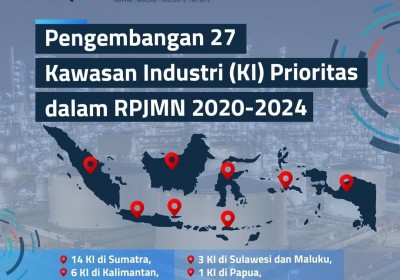Kemenperin Encourages Industrial Zone Operators to Expand
April 22, 2021
JAKARTA – The Industry Ministry (Kemenperin) is urging the operators of Indonesia’s industrial zones to step up their expansion efforts to help stimulate economic recovery following the impacts of the COVID-19 pandemic.
Expansion efforts, said the ministry, would help capture more opportunities for new investment to come in, such as the relocation of production factories by international manufacturing companies.
The construction and development of industrial zones is part of the Kemenperin’s general plans to develop Indonesia’s industrial sectors. The ministry’s director general of industrial security, zoning and international access (KPAII) Eko S.A. Cahyanto specifically praised the operators of the PT Kawasan Berikat Nusantara (KBN) and PT Jakarta Industrial Estate Pulogadung (JIEP) industrial zones for their role in developing and upgrading the infrastructure of the zones under their command.
“Despite the operators’ good work, it is time for these two zones to expand their investments outside of their zones because these two zones are classified as ‘generation 2’ industry zones,” Eko said in a written statement sent on Thursday (25/3).
According to Eko, the Kemenperin will continue accommodating the needs of zone operators to attract more investment into their zones. Among the needs are suggestions made by KBN and JIEP operators to cap rental rates, agreements on tenant land usage, expanding opportunities to work with foreign direct investment, and settling right-to-manage (HPL) and right-to-build (HGB) issues in the zones themselves.
Eko added that both operators are planning to expand outside of their locations. The KBN plans to develop a new industrial zone in Takalar regency, South Sulawesi costing Rp 10 trillion, called KI Takalar, which will focus on nonferrous metal recycling industries, accommodating the separation, refinement, smelting, molding and component fusing processes.
KI Takalar is included in the government’s 2020-2024 National Medium-Term Development Plan (RPJMN) as a key strategic project. The zone’s masterplan states a possible size of 3,500 hectares, with the initial stage of construction occupying 350 hectares.
“Meanwhile, JIEP is currently in the process of developing the KI Manyingsal Subang in Subang, West Java, with a number of other state-owned consortiums. The development of the KI Manyingsal Subang is the joint project of three state-owned companies, which are PT Pembangunan Perumahan (PT PP), PT Rajawali Nusantara Indonesia (RNI) and JIEP, with help from the Subang government,” he elaborated clearly.
KI Manyingsal Subang will occupy 1,500 hectares of land and is strategically located near several key accessways. It will be located only 1km from the Cipali Tollroad, 11km from the Pantura highway, 14km from the Pegaden train station, 45km from the Patimban Port and 76km from the Kertajati Airport.
Eko emphasized that the ministry will make sure the development process of these two locations will be run smoothly, assisting in certain actions such as infrastructure support and land acquisition.
“We are currently in the middle of convincing the central government to contribute to the infrastructure development process by submitting budget proposals from related ministries and institutions, while land acquisition efforts will be done through the Land Procurement for Public Use scheme,” he explained.
Kemenperin data showed that there are currently 128 operational industrial zones in Indonesia that have secured the proper operational permits. Meanwhile, 38 zones are currently being constructed.
The development and construction of industrial zones are priorities within the 2020-2024 RPJMN, with 27 zones planned outside of Java: 14 in Sumatera, 6 in Kalimantan, 1 in Madura, 3 in Sulawesi and Maluku, 1 in Papua and 1 in Nusa Tenggara.
Afterwards, the Kemenperin will focus on accelerating the development of halal industry zones.
Indonesia’s Research Institutions Supporting the Development of the Electric Vehicle Industry
Indonesian Muslim Fashion and Cosmetics IKMs Shine at Dubai World Expo 2020
Govt Steps Up UMKM Transformation Efforts in the Midst of Pandemic Slowdown
Govt Encourages Promotion of IKM Products in Digital Era
Government Begins Developing Maritime Training Center in Makassar
Tweets by IDDevForum
